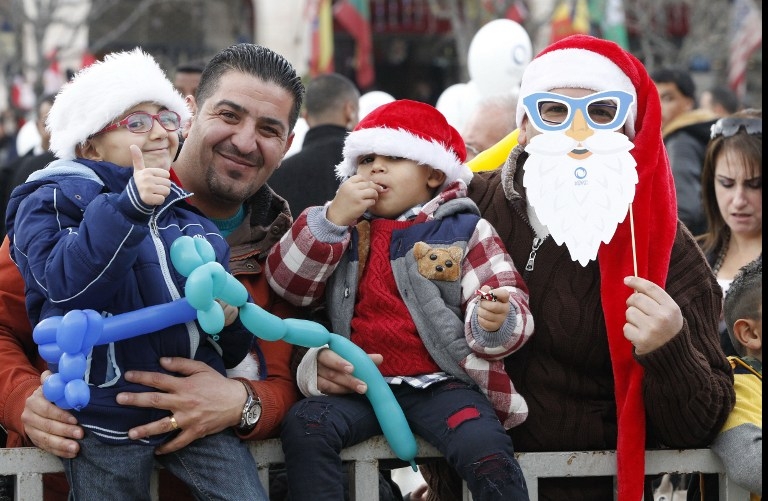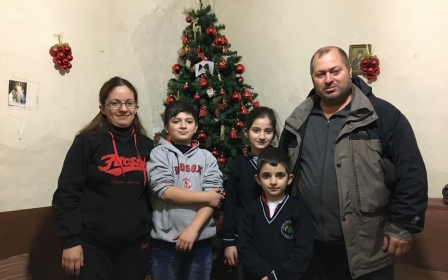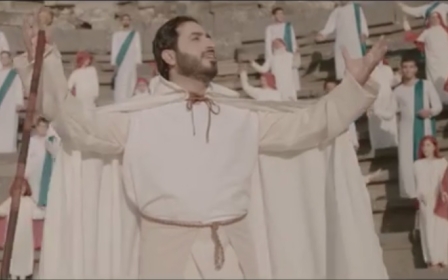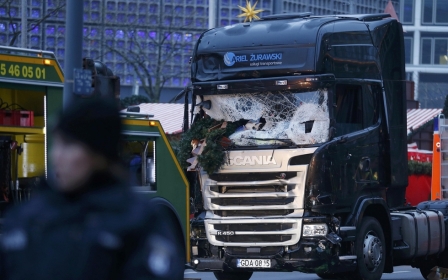Pilgrims in Bethlehem, fears in Europe on Christmas Eve

Pilgrims gathered in Bethlehem on Saturday for Christmas Eve, while across Europe people sought to generate some holiday spirit amid tight security in the shadow of the Berlin market attack. Meanwhile, in battered Aleppo, newly retaken by Syrian government forces, local people were preparing to mark Christmas, freed from the threat of bombardment.
Dozens of Palestinians and tourists flocked to Bethlehem's Manger Square, near the Church of the Nativity, where celebrations were due to culminate with a midnight mass at the site where Christians believe Jesus was born.
Some snapped selfies near the square's giant Christmas tree and watched the annual Scouts parade in the city, a short drive from Jerusalem in the Israeli-occupied West Bank.
"This is Christ's land, the land of peace," said Ramzi Abu Khalil, who was wearing a red Santa hat.
"We take pride in him. All Christians should come today to Bethlehem. This is a holy day for us and a day of pilgrimage."
Violence put a damper on celebrations in Bethlehem last year, as a wave of knife, gun and car-ramming attacks by Palestinians targeted Israelis and sharply reduced the number of Christmas visitors.
The unrest has subsided in recent months and, with major Bethlehem hotels booked up, many in the city were optimistic this year's holiday season would bring more visitors.
Candles, flowers in Berlin
In Europe, many preparing to celebrate were still reeling from this week's truck attack on the Berlin Christmas market.
Hundreds of investigators were working through the holiday season hunting possible accomplices to Tunisian Anis Amri, who was killed Friday in a shootout with Italian police near Milan.
Amri, 24, is believed to have hijacked a truck and used it to mow down holiday revellers at the market on Monday, killing 12 people in an attack claimed by the Islamic State (IS) group.
Tunisia said Saturday it had arrested three men suspected of links with Amri, including his nephew.
Locals and tourists in Berlin visited the Christmas market targeted in the attack, and many took a moment to quietly light a candle or lay flowers for the victims.
"It's really nice there are so many people here and it's still open," said Marianne Weile, 56, from Copenhagen.
"So even though you are really sad about what happened, you can still keep Christmas. It's not like this crazy guy ruined it for everybody."
Security was tight elsewhere in Europe for the holidays, including at Milan's cathedral, where police were out in force, and concrete barricades had been erected around the Piazza del Duomo, where a Christmas market is held.
In France, 91,000 police, gendarmes and soldiers had been deployed to guard public spaces including churches and markets.
In the northern city of Lille, concrete blocks had been laid in areas around the city to prevent vehicle attacks, prompting 62-year-old Michelle to ask: "How far are we going to go?"
First Aleppo mass in years
Christians in Syria's Aleppo were looking forward to celebrations after President Bashar al-Assad's forces retook full control of the city following a rebel withdrawal this week.
Members of Aleppo's Catholic minority have been preparing for the first Christmas mass in five years at the Saint Elias Cathedral in the Old City.
The famed cathedral's roof collapsed years ago under a salvo of rocket fire, but this week members of the community were clearing out debris to prepare for the service.
"All our memories are here. This is where we celebrated all our feast days, our joys," said Bashir Badawi, rummaging through rubble for wood and scrap metal to make a crude Nativity scene.
"We want to transform all this destruction into something beautiful."
In Bartalla, near the Iraqi city of Mosul, Christians were also holding a service for the first time since their town was recaptured from IS.
The Islamic militants destroyed crosses at the Mar Shimoni church in Bartalla and set it alight, but volunteers worked for days to ready it for the first service in more than two and a half years.
"We want to deliver the message that we are staying in this country and that these are our roots and our origins," Father Yaqub Saadi, the church's priest, told AFP.
Iraqis mark Christmas eve in town recaptured from IS
Meanwhile, Iraqi Christians filled the pews of the fire-scarred Mar Shimoni church in a town east of Mosul on Christmas Eve for the first service since its recapture from Islamic State fighters.
The Islamic State group destroyed crosses at the church in the town of Bartalla and set it alight, but volunteers worked for days to ready it for the service, the first held here in two and a half years.
The damage done by IS is still visible: pieces of crosses can be found in and around the church, parts of it are still charred from the flames, and the face of a statue near its entrance has been smashed, the hands broken off.
But a new cross has been erected on top of the church, and the Christmas Eve service held here is a step on what will be a long road to recovery for the town.
For some of the displaced Christians of Bartalla, it was a deeply emotional experience.
"I can never describe... our happiness and everything. We feel like life returned," said Nada Yaqub.
"We felt that our cross is still around our necks. No one could take it from us."
Matti Hanna called the jihadists who displaced the town's people "criminals".
"My feelings are the feelings of all the people of Bartalla, the same feelings: we missed this day... we missed it a lot," said Hanna.
IS seized Bartalla and swathes of other territory north and west of Baghdad in the summer of 2014, leaving Christians with the grim choices of conversion, paying a tax, fleeing or death.
The town was recaptured as part of the massive military operation to retake Mosul, the last IS-held Iraqi city, which was launched on October 17.
Middle East Eye propose une couverture et une analyse indépendantes et incomparables du Moyen-Orient, de l’Afrique du Nord et d’autres régions du monde. Pour en savoir plus sur la reprise de ce contenu et les frais qui s’appliquent, veuillez remplir ce formulaire [en anglais]. Pour en savoir plus sur MEE, cliquez ici [en anglais].




